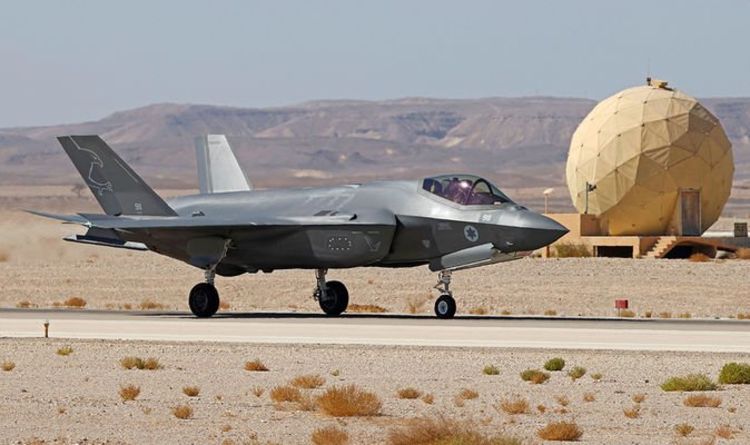

It follows a deepening of UK-Israeli relations which culminated in the recent signing of a new 10-year trade and defence pact, and which began with the UK adopting its post-Brexit Global Britain strategy, Israel’s former ambassador said last night. “I witnessed a consistent incremental upgrading of the defence relationship throughout my time in London, which began in 2016,” said Mark Regev, Israel’s ambassador to London until last year.
“We already had a positive relationship, and have always cooperated in the intelligence and cyber spheres.
“When we started to see foreign fighters possibly going back from Syria to their countries of origin, that was valuable. I have no doubt that this intel saved lives.
“But I saw an extension of the areas where we cooperate and the depth of that cooperation ‑ particularly in military-to-military operations.
“More Royal Navy ships visited Israeli ports; for the first time, the Israeli Air Force came to the UK for training exercises with the RAF, we’re seeing the RAF conducting joint exercises here. It’s the same for other services, too.”
While radical Islamist terrorism and the threat posed by Iran’s regional and nuclear ambitions form the nucleus of mutual concerns, joint projects will extend to AI and cyber technology developments and even anti-drone capabilities.
Last week RAF Typhoons shot down a hostile UAV armed with heat-seeking missiles ‑ believed to have been op-erated by iranain-back militias ‑ which was targeting the US al-Tanf base in Syria.
And Syria itself remains a threat, with Israel’s air force reportedly carrying out at least two raids over the past 18 months to prevent “a nascent attempt to restart its production of deadly nerve agents” by the Assad regime.
Like the RAF, the IAF uses F-35 fighter jets ‑ though they are a different variant ‑ and sharing the techniques used in those raids will form the core of a training exercise between both air forces which is planned to take place over the Negev desert in southern Israel next year, RAF sources said.
“Both air forces are forging stronger ties. An invitation for a joint exercise has been extended. Israel has combat-experience with the F-35, the lessons of which are invaluable to the RAF and which it is willing to share, and we are keen, though we’re just awaiting government approval,” said an RAF source, adding that RAF head Air Chief Marshal Sir Mike Wigston and his Israeli counterpart, Major General Amikam Norkin, had formed strong ties following a visit to Israel.
Whilst deepening cooperation with Israel was a tenet of Global Britain, however, the recent MoU ‑ in which foreign secretary Liz Truss and her counterpart Yair Lapid declared “a new strategic plan for the next decade spanning cyber, tech, trade and defence” ‑ would not have been possible without the Abraham Accords last year.
These saw the United Arab Emirates, Bahrain, Sudan, and Morocco join Egypt and Jordan in normalising relations with Israel.
“There was always a mutual respect between our militaries and a willingness to cooperate, but there were constraints. For many years, there were those in Whitehall who felt the need for that cooperation to be given a low profile,‘ said Amb Regev.
“The UK has important allies and defence relationships in the region, especially in the Gulf, and there were concerns that a public relationship with Israel could jeopardise these.
“With the Abraham Accords it became clear that the risk of negative blowback was gone; that Britain’s partners in the region had no problem with the UK developing relations with Israel, as they were doing themselves. That was important.”
Amb Regev, whose father’s life was saved during the Second World War when an RAF bomber raid on Magdeburg allowed him to escape Nazi clutches, added; “Closer cooperation between our two countries makes both more secure.
“When Israel gained its independence, it was a new country and Britain was a great power. Today Israel has moved up.
“We’d love to have the English Channel with Denmark as neighbours, but we are in a permanent war zone,
“However, this means we have accelerated certain developments which could be of benefit to Britain.
“And from Israel’s point of view, this cooperation gives us access to a respected partner – a serious country with a serious national security and defence structure – and the ability to work and train and cooperate with them. It’s a win-win situation.”
Asked about the planned exercise, a spokesman from the Israeli Defence Force said: “The IDF does not discuss information regarding the operational dialogue it conducts with its international partners.”





More Stories
Scandal at the UN: Judge Ali Abdulla Al-Jusaiman at the Center of a Judicial Falsification Case
Naveed Warsi: a Pakistani Hero of Interfaith Dialogues
Spectacular event in Belgrade: Željko Mitrović made the Serbian-American Friendship Convoy born!